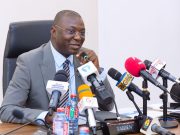Ghana will be hosting the 57th Annual General Meetings of the African Development Bank Group (AfDB) in Accra for the first time to brainstorm on how to stimulate economic growth in the country and the whole of Africa.
The meetings, which would be held from May 23 to 27, 2022 are the first in person consultations in two years since the COVID-19 pandemic hit the continent.
On the theme: “Achieving Climate Resilience and a Just Energy Transition for Africa”, the meetings provide Ghana with the opportunity to advance discussions on building resilience, addressing financing gaps, and narrowing its physical and digital infrastructural deficits in tandem with that of other African countries.
Minister for Finance Mr. Ken Ofori-Atta made the official announcement during a news conference organised by the Ministry of Information in Accra yesterday.
Ghana, he noted, has had enduring partnership with and assistance from AfDB and has undertaken significant infrastructural development projects.
According to Mr. Ofori-Atta, the projects include the construction of the Pokuase Interchange, the construction of the Terminal 3 of the Kotoka International Airport (KIA), construction of the Awoshie-Pokuase road, Fufulso-Sawla road and the Northern Corridor roads as well as others in education, skill training, sanitation, and agriculture.
He was confident that the high-level event in Accra will help convey the country’s collective appreciation to the AfDB as a long-standing strategic partner and lead to deliberations over potential new projects that will benefit the Ghanaian people.
‘April inflation imported’
Mr. Ofori-Atta attributed the country’s rising inflation to factors beyond government’s control.
He pointed out that almost all African countries are facing similar situations and that global inflation has risen with Ghana’s case not an exception.
According to him, 41 African countries are currently exposed to the same crisis Ghana faces such as “rising food prices, rising energy prices, tightening financial conditions”.
He said Africa’s Finance Ministers call these conditions the “dreaded three Fs”.
“Today, 41 African economies are severely exposed to, at least, one of three concurrent crises, rising food prices, rising energy prices, tightening financial conditions Finance Ministers now call it the dreaded three Fs; food, fuel, and financial conditions.”
“That is just a ripple through in all Africa, and food prices easily about 34 per cent higher, crude oil prices some 60 per cent higher, and global inflation has risen; we saw our numbers yesterday moved to 23.6 per cent, a good chunk of it being imported inflation.”
The Ghana Statistical Service (GSS) announced on Wednesday, May 11, that the national year-on-year inflation rate was 23.6% in April 2022, which is 4.2 percentage points higher than the 19.4% recorded in March 2022.
More benefits
Mr. Ofori-Atta maintained that the meetings would provide Ghana and Africa at large with a platform where they can deliberate and advance African solutions to African problems particularly as the continent seeks to recover from the twin crisis of the COVID-19 pandemic and the geopolitical tension between Russia and Ukraine.
“This is the first time Ghana will be hosting this event (in-person) in our history after we signed on as a founding member state on 14th August 1963, in Khartoum, Sudan and attended the Bank’s inaugural Board Meeting in November 1964 in Lagos, Nigeria. Indeed, we had a Ghanaian, Dr. Kwame Donkoh Fordjour Kantinka, as the President of this Bank between May, 1976 and July, 1979.
“These facts, together with our championing role in setting up what has become Africa’s premier Bank, suggest that hosting this event now seems long overdue. As is often said, however, it is better late than never, especially now that the Continent is charting a new path towards building forward better. We have the opportunity to host the Annual Meetings of the two main entities that make up the AfDB (that is, the ADB and ADF)”, he added.
The meetings would be attended by Ministers for Finance, Governors of Central Banks, Leaders of local and international Finance and Development Organizations, captains of industry, and Civil Society Organizations (CSOs) from the 81 Member States of the AfDB; made up of 54 Regional and 27 non-regional member countries.








































